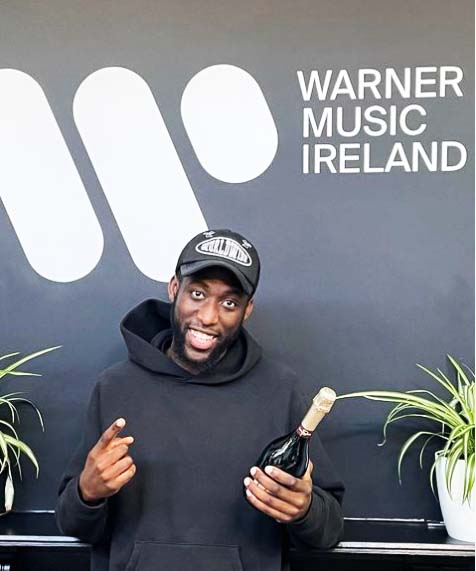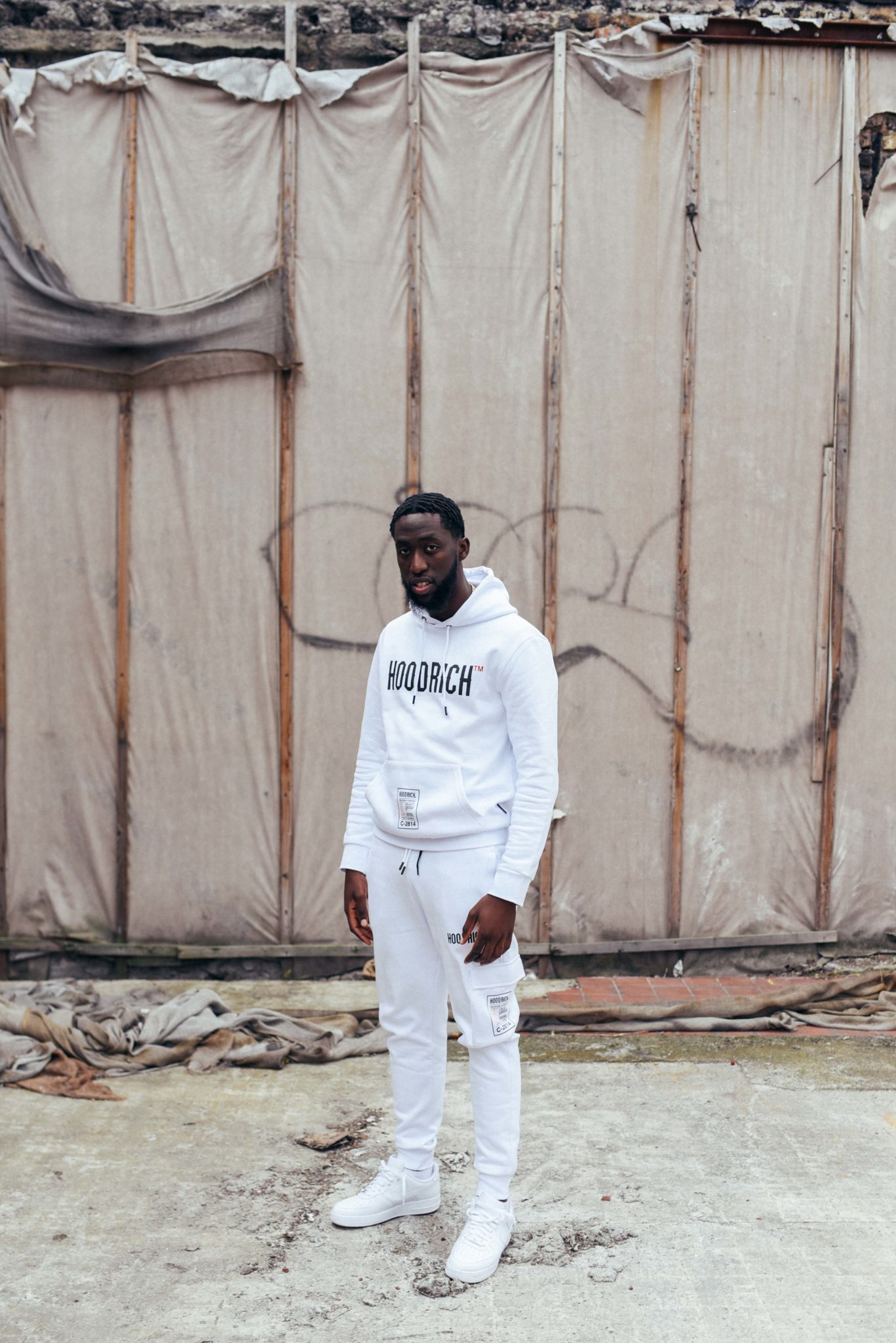- Culture
- 17 Oct 22

In a landmark moment for the Irish drill scene, Clondalkin rapper Selló signed a major record deal on both sides of the Irish Sea this year. Now, as he returns with his debut mixtape, SellóTape, the rising star discusses identity, work, the Irish scene, and his own brand of Gaelic Drill.
Rap, at its rawest roots, is all about community – and few artists embody that spirit in Ireland today quite like Clondalkin’s Selló.
It’s been just over 18 months since his debut single ‘Dublin’ marked him as a crucial new force in Irish music, with his irrepressible hometown pride and his unapologetic Dublin accent earning him international praise and over a million streams on the track. Plenty has changed for Selló in the year-and-a-half since.
In a monumental first for the Irish drill scene – a rap subgenre that, despite massive online popularity, has yet to make the mainstream leap here – the Dublin rapper signed a major deal with Warner Music Ireland, and the UK’s Atlantic Records, as part of their joint venture with Irish label Trust It Entertainment.

Credit: @sello_ire
Advertisement
But right now, Selló’s day-to-day reality isn’t quite aligned with the image you might have of a young artist who just inked a serious record deal. In fact, when he calls into the Hot Press office, it’s during a rare spare moment – as he continues to balance his burgeoning music career with his day job in social care, working with adults with disabilities.
“I’m in charge of social integration,” he says of his job. “Community-spirit-based stuff, like making sure their shopping is done, or their laundry, or taking them to the pub, or the cinema, or if someone wants to see a match, organising that.
“I have another job as well, my placement, which is with homeless people,” he continues. “And people with addiction. It’s just mad, homelessness – with a lot of the people there, you wouldn’t even know it.”
That kind of work has had a profound impact on the way he views the world, he says.
“One of the fellas that’s in there is the same age as me,” Selló resumes. “He was telling me about his experiences. He’s clean off everything. But he said his roommate is on all sorts of stuff, and he can’t even sleep most of the time. And because of the homeless crisis, he has nowhere to go. So either he stays, and sees that everyday and tries to stay away from it, or he stays on the street. It’s messed up.”
He’s carried that community-centred ethos into his music too, making headlines this year with a string of performances at schools in his local area. He also led a free course for aspiring young rappers, after being announced as this year’s Writer In Residence for South Dublin Libraries’ Red Line Festival.
All of this is also coinciding with the release of his debut mixtape, SellóTape – an Irish-folk-sampling, stereotype-defying project that has the potential to transform the way homegrown drill and rap is viewed forever.
Advertisement
But given his naturally grounded nature, it took some time for him to come to terms with his role at the forefront of the scene. His first festival season this year, which included a performance at Longitude, was an eye-opener.
“I do look at myself as a lot smaller than I am,” he smiles. “But I went out, and everyone was screaming. And from start to finish, I felt like a rapper. I never really felt like a rapper till then – I’d be like, ‘I just do music.’ But that day I realised people are here, listening to what I’m putting out.”
View this post on Instagram
The Main Stage at Longitude is a colossal jump from the yard at school, where Selló first got his start in music.
“I used to always freestyle at lunchtime,” he recalls. “There’d be a group of 60 kids standing around – it would look like a fight, basically! – and I’d just be freestyling in the middle. I used to have my speaker playing out of my bag, and if a teacher was coming, I’d lower the volume.
“Once the principal grabbed me and took me to the office, and said, ‘You can’t be doing that! It’s causing a ruckus.’ But then another time a teacher actually joined in, battle rapping! Mr Anderson – I love him to bits.”
Advertisement
From there, word about Selló’s star power spread.
“At the time, I wasn’t even looking at entering music,” he reveals. “It was more of a thing I did for the buzz. But everywhere I’d go – even in the barbershop, before a haircut – they’d always get me to rap. That’s how I met one of my previous managers, and that’s pretty much how I started.”
His music career took his family by surprise – as the rising star mostly worked on his craft behind closed doors.
“They didn’t know I was doing music,” he explains. “I remember in church on Sundays, kids would come to me like, ‘Can I get a picture?’ And their parents would be like, ‘You know your son’s a rapper?’ My mum asked me if I was a rapper, and I was like, ‘No!’
“I was doing music for two years before my mum found out,” he adds. “I kept it to myself. In my head I was like, ‘Once it gets big enough, they’ll see it.”
And they’ve certainly seen it now – with Selló playing a pivotal role in a homegrown drill scene characterised by a DIY spirit, hard-hitting sounds and vibrant visuals, alongside fellow Irish heavy-hitters like Drogheda’s A92 and their breakout star Offica. While Selló agrees that the music community here is strong, he believes that two separate scenes have emerged when it comes to Irish rap and hip-hop.
Advertisement
“On one side, it’s the underground rappers, the drill rappers,” he elaborates. “Which I would classify myself as. A92, Offica, Reggie B. And then, on the other side, you’ve got Aby Coulibaly, Monjola, Mango x Mathman, Denise Chaila. They have their own buzz. We’re all cool, and we cross paths as friends, but our music has completely different fanbases. And sometimes, it’s as if we’re not part of the culture as well.
“There’s that buzz of, ‘Which side are you on?’” he adds. “I have these conversations with Monjola. We’re constantly trying to blend those two scenes together, to make it one scene. I didn’t even understand it until I became a rapper, and started hearing what these people behind the scenes actually say about our type of music – me, Offica and A92. It’s tough to see, because we’re up there in the scene in Ireland, but we’re not looked at as artists.
“Hopefully, once the tape is released, people will understand that there is artistry to what I do,” he says. “Rather than just being looked at as a street rapper.”
Signing his deal could also be a crucial moment in bridging the gap between what Selló sees as those two scenes in Ireland.
“I can’t remember the last raw rapper, who used lots of slang and colloquial language, to get signed,” he remarks. “So I feel like I’m the first. It’s had a massive effect on a lot of people on our side of the scene."
Selló’s 2021 collaboration with Offica, ‘Oggy’ – an anthem that turns clichés about Irishness on their head – has also been included on SellóTape.
Advertisement
“'Oggy' was needed,” Selló reflects. “In Ireland, we get too many stereotypes – like we love Guinness, we love to fight, and we all have ginger hair. I don’t have ginger hair, and that doesn’t mean I’m not Irish. So ‘Oggy’ was saying, ‘Look, the Black Irishness is here. This is the new culture.’ We’ve taken the stuff that was here before us on board, and adapted it.”
“A lot of artists make it gimmicky, being Irish, rather than pimp it,” he adds. “That’s where I come in: ‘I’m Irish! What are you going to do?!’ I want to show that side, rather than make it this jokey, happy-go-lucky thing.”
There’s certainly plenty of ways a fusion of rap and Irish influences could be turned into something gimmicky – but Selló has consistently incorporated the worlds in a way that feels both revolutionary and imbued with respect for both sounds.
Across SellóTape, produced by Max Crowley, you’ll find samples of Sinéad O’Connor singing ‘Paddy’s Lament’, Lankum’s Radie Peat singing ‘Dark Horse On The Wind’, and Irish Traveller Mary Kate McDonagh singing ‘The Tri-Coloured House’. Plus, a track heavily based around ‘Come Out Ye Black and Tans’ that he admits could be “controversial as hell” – and reckons recent Hot Press cover stars KNEECAP, who he’s previously opened for, could offer up a decent remix of.
“People have started seeing that what we’re doing is revolutionising drill music,” Selló says. “We’re creating something that’s never been seen before. We call it Gaelic Drill. Me and Max actually wanted to call it Ceol, but obviously Americans would say ‘Key-Ole’ or ‘Cowl’ or something. They’d ruin the name! So we said, ‘Let’s not’ – because I get really sensitive about stuff like that…”
Of course, over the years, many Irish drill artists have been accused of adopting English accents in their songs – with Selló receiving praise from the outset for doing the opposite, and taking a distinctly Irish approach.
Advertisement
“My stance on that has changed,” he says of those accusations. “At first I was very like, ‘Oh yeah, you can’t be saying you’re from Ireland if you sound English!’ But then, I was thinking, ‘People need to go through that phase in their career, before they really discover themselves.’ And we’re still at that stage.
“I still get so much hate,” he continues. “People telling me, ‘This is not Ireland, it doesn’t look like Ireland, it’s Africa!’ – obviously because of all the Black fellas in my videos. They’re like, ‘Fuck off back to wherever you come from’. The usual stuff.”
As such, he thinks that the development of a proper drill and rap scene here “might take a while.”
“No one’s really at that stage of their careers yet – bar me and three or four other Black lads – where we can be like, ‘We need to build this thing from the ground, rather than trying to get into another scene.’
“But everybody needs to create what they want to create,” he adds. “And they shouldn’t be looked at as ‘not Irish.’ Maybe they’re not promoting the culture, as I am, but they are from Ireland, they learn as Gaeilge, and they go through the same shit I go through.”

Selló. Copyright Miguel Ruiz.
Advertisement
His own masterplan is to ultimately hit Jay-Z levels of success – complete with “buying football teams, buying the Airtricity League, and maybe a share in the Leinster team…”
“By then, the foundations of the rap culture here would have been created,” he explains. “We’d be looking at global success as Irish rappers.”
He may have lofty goals, but Selló is also under no illusions about the realities of ascending to stardom as a young rapper.
“The numbers I get now don’t make me different to the person I used to be,” he reflects. “And they don’t make me better than someone who’s not getting them. Being able to remain grounded is massive. The main reason I started this was to do something that hasn’t been done before. To make people in the UK and the US understand that: ‘Yo, we’re here! This is Ireland. We’re not gimmicks, and we’re not here to laugh.’ That hasn’t been done in the rap scene in Ireland.”
SellóTape is out now. Selló plays the Green Room at the Academy, Dublin on Saturday, December 10.










